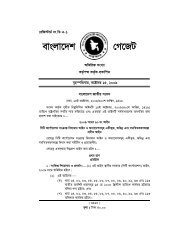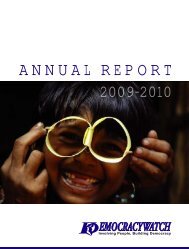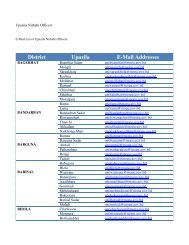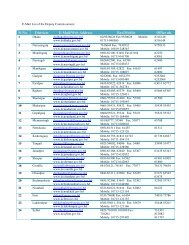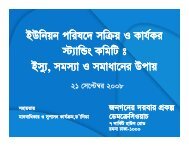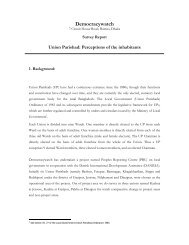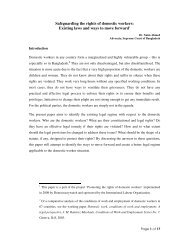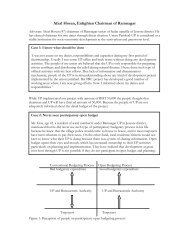Reproductive Decision Making Role among ... - Democracywatch
Reproductive Decision Making Role among ... - Democracywatch
Reproductive Decision Making Role among ... - Democracywatch
- No tags were found...
You also want an ePaper? Increase the reach of your titles
YUMPU automatically turns print PDFs into web optimized ePapers that Google loves.
populations are growing at alarming rates. Disinvestment in rural areas, conflict, natural,disasters, climate change, forced evictions and corporate land grabbing continue to forcepeople to migrate to cities where affordable housing is scarce.The growth rate of urban population is almost double than that of the rural population.People living in slums experience a staggering number of human rights violations. This studywill help to know about the present reproductive decision making situation of slum dwellers.The absence of health facilities and schools within many slums severely restricts access tohealth care and education. Malnutrition and child mortality rates in slums often match ruralareas. Women are particularly vulnerable in slums, where lack of facilities place them atgreater risk of sexual assault and harassment and where the reporting of domestic violenceis often not treated seriously by police. Property law also frequently discriminates againstwomen.Health facilities are not adequate for the slum dwellers. As a result of this acute shortage ofhealth facilities most slum dwellers are either entirely left out of health services or receivevery poor quality health care. Because of the weak paying capacity <strong>among</strong> the slum people,even the private health care is also absent in the slums. The urban poor are forced to takealternative to unqualified health providers.Improving access to health services to the urban poor is a challenging for a variety ofreason. Urban health infrastructure in most cities is inadequate to meet the demands of largesections of the urban poor. Currently there is one Urban Health Centre for every 230,000persons as against the norm of one centre for every 50,000 population. As a result of thisacute shortage of health facilities most slum dwellers are either entirely left out of healthservices or receive very poor quality health care. Because of the weak paying capacity<strong>among</strong> the urban poor, even the private health care is also absent in the slums. The urbanpoor are forced to take alternative to unqualified health providers.Since family planning services are usually centered on women, it is required to find thatwhether they can take reproductive decisions without their husbands consent as thetraditional head of the home or not. So it is necessary to reshape the decision-makingenvironment in a way that would undermine the coercive patriarchal systems and createsconditions favorable to female autonomy, late marriages and smaller family size. In otherwords, the social context of sexual and reproductive decision-making should be wellexplored. Towards this end, it is vital that we have objective insight into the personal,household and social factors influencing fertility regulating behavior of individuals andcouples and on the basis of this suggest possible solution for problems of gender inequality,women empowerment and low fertility rate in the slum areas of Dhaka city. This workinvariably leads to new research questions and agenda that can enhance our knowledgeand understanding of the culture, power relationship <strong>among</strong> couples and how these affectsrole expectations, child bearing and rearing practices.This study will also help us to understand government health delivery system in slums,treatment seeking behavior for various reproductive morbidities (Gynecological, Obstetricand Contraceptive Morbidity) and discuss various homemade remedies women uses and




